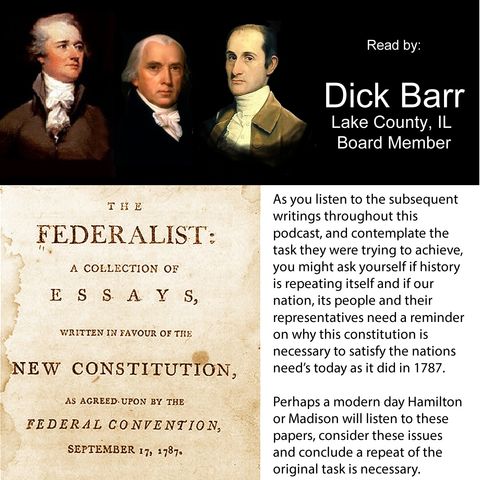Federalist 16 -The Same Subject Continued - The Insufficiency of the Present Confederation to Preserve the Union
18 gen 2023 ·
13 min. 8 sec.

Scarica e ascolta ovunque
Scarica i tuoi episodi preferiti e goditi l'ascolto, ovunque tu sia! Iscriviti o accedi ora per ascoltare offline.
Descrizione
Federalist 16, Alexander Hamilton the New York Packet: December 4, 1787. Hamilton begins this essay by restating that it is an absolute fact that the present confederation, because of the...
mostra di più
Federalist 16, Alexander Hamilton the New York Packet: December 4, 1787.
Hamilton begins this essay by restating that it is an absolute fact that the present confederation, because of the manner in which it has been set up, is the "parent of anarchy," and that the delinquencies of the states of the Union are the "natural offspring" that will lead the country to civil war. From this point, Hamilton proceeds to hypothetically go through the consequences of a lack of a large, standing, national army. In Hamilton's opinion, the end would be a war between the states because the strongest state is likely to prevail in any disagreement with no national army to put the states in their proper place. This would be the violent death of the confederacy. The other alternative would the "natural death" - what Hamilton thought the country was in the midst of at the writing of the Federalist Papers. If there is not war between the sates, the states would simply do their own bidding, disregarding the federal government, and the federal government's power would erode until it was completely eradicated.At this point, Hamilton reminds his reader that the country should prefer a national constitution, and one that has provisions for a large army, "continuously on foot to execute the ordinary requisitions or decrees of the government." While some of the critics of the constitution want to believe that there is an alternative, anything else is impractical. From this argument for a standing army, Hamilton proceeds to discuss the necessity of not governing merely the states, but of the government having power over the individual. The government must "carry its agency to the persons of the citizens." Hamilton proceeds to argue that the individual state legislatures should not have to approve the laws because they could disregard the laws, and their disregard would ruin the system of law in the country. Unity of the country is paramount, and the only way unity can occur is through a strong, national government. Alexander Hamilton concludes his essay by claiming that no government can always avoid or control those who will be disorderly, but it would be "vain to hope to guard against events too mighty for human foresight or precaution, and it would be idle to object to a government because it could not perform impossibilities."
mostra meno
Hamilton begins this essay by restating that it is an absolute fact that the present confederation, because of the manner in which it has been set up, is the "parent of anarchy," and that the delinquencies of the states of the Union are the "natural offspring" that will lead the country to civil war. From this point, Hamilton proceeds to hypothetically go through the consequences of a lack of a large, standing, national army. In Hamilton's opinion, the end would be a war between the states because the strongest state is likely to prevail in any disagreement with no national army to put the states in their proper place. This would be the violent death of the confederacy. The other alternative would the "natural death" - what Hamilton thought the country was in the midst of at the writing of the Federalist Papers. If there is not war between the sates, the states would simply do their own bidding, disregarding the federal government, and the federal government's power would erode until it was completely eradicated.At this point, Hamilton reminds his reader that the country should prefer a national constitution, and one that has provisions for a large army, "continuously on foot to execute the ordinary requisitions or decrees of the government." While some of the critics of the constitution want to believe that there is an alternative, anything else is impractical. From this argument for a standing army, Hamilton proceeds to discuss the necessity of not governing merely the states, but of the government having power over the individual. The government must "carry its agency to the persons of the citizens." Hamilton proceeds to argue that the individual state legislatures should not have to approve the laws because they could disregard the laws, and their disregard would ruin the system of law in the country. Unity of the country is paramount, and the only way unity can occur is through a strong, national government. Alexander Hamilton concludes his essay by claiming that no government can always avoid or control those who will be disorderly, but it would be "vain to hope to guard against events too mighty for human foresight or precaution, and it would be idle to object to a government because it could not perform impossibilities."
Informazioni
| Autore | Dick Barr |
| Organizzazione | Dick Barr |
| Sito | - |
| Tag |
Copyright 2024 - Spreaker Inc. an iHeartMedia Company
